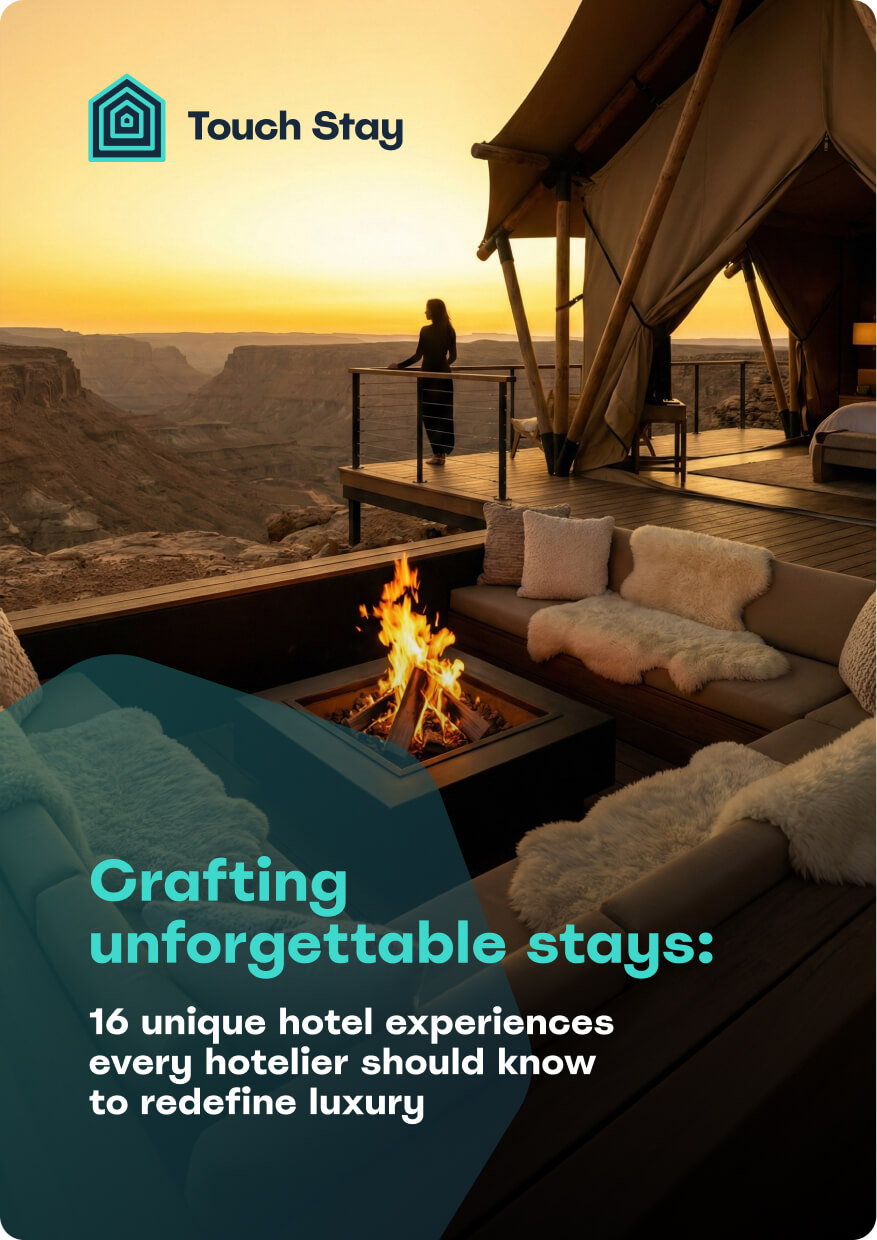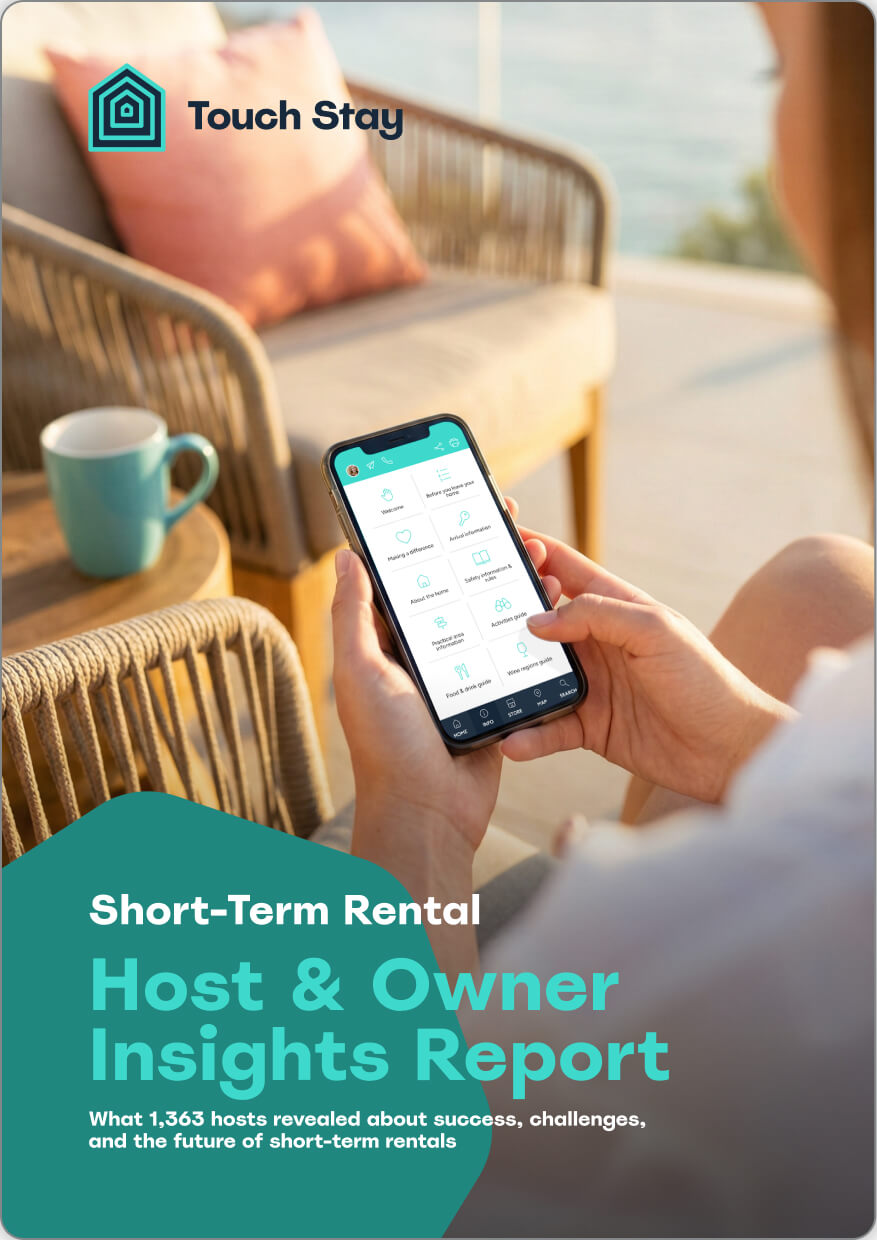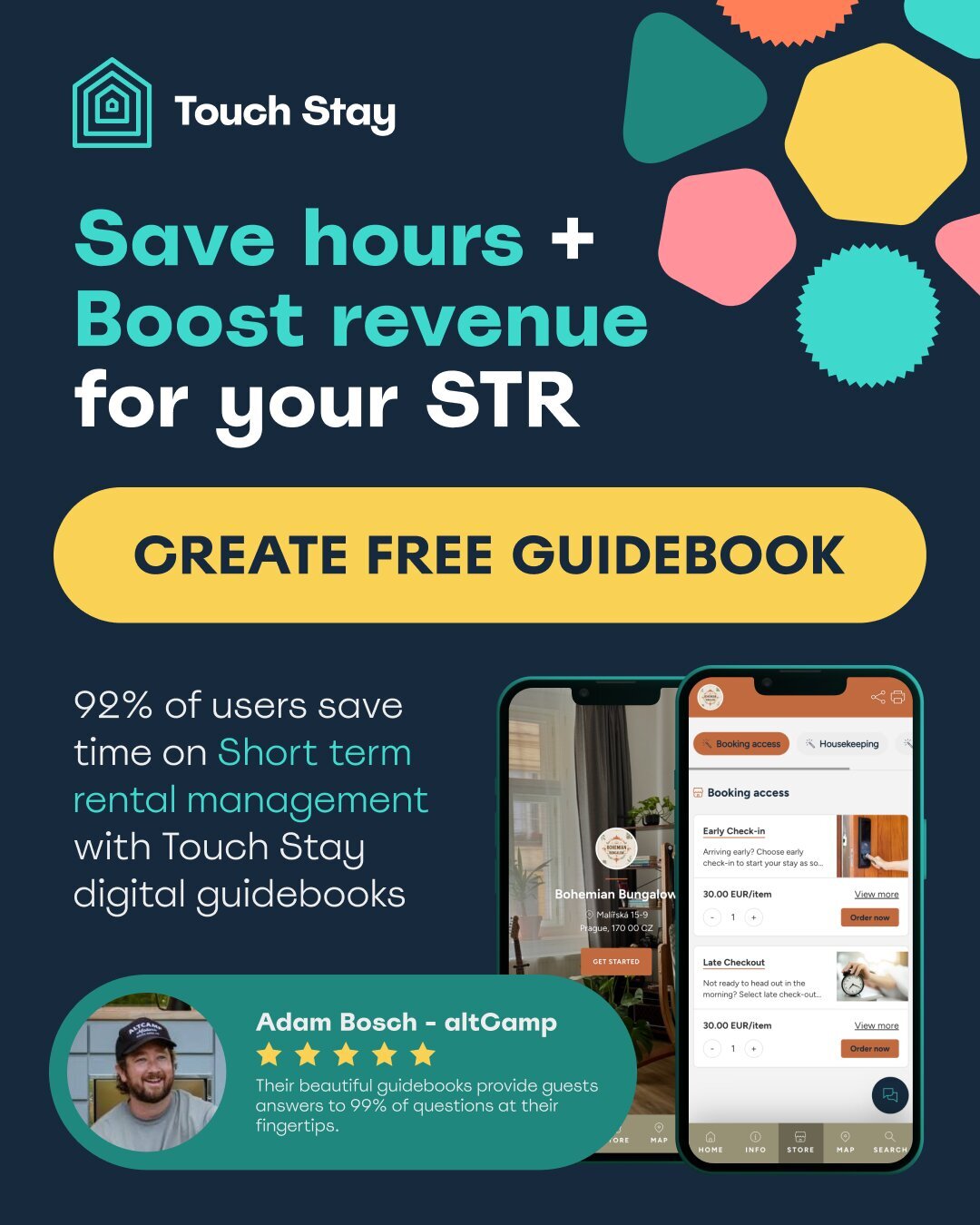Airbnb has become a hugely popular choice for travellers worldwide, offering unique accommodations and experiences. However, many potential guests wonder about the platform's age restrictions. This comprehensive guide will explain the airbnb age limit and policies, helping you understand who can book and stay at Airbnb properties.
Key points covered in this article:
- What is Airbnb's minimum age requirement?
- Age restrictions for specific types of listings
- Why does Airbnb have age restrictions?
- How hosts can set their own age limits
- What happens if you violate Airbnb's age policy?
- How does Airbnb prevent underage guests from booking?
- Can I deny children at my Airbnb?
- Alternatives for younger travellers
- Conclusion
As a short-term rental host, it's vital to have a clear and easily accessible way to communicate your house rules, including age requirements, to guests. A Touch Stay digital guidebook can reduce guest questions and enhance the user experience!
What is Airbnb's minimum age requirement?
One of the most common questions potential Airbnb users ask is, "How old do you have to be to rent an Airbnb?" Let's break down the general requirements and some important exceptions to the airbnb age limit.
General age requirement
Airbnb's minimum age requirement for booking is typically 18 years old in most countries. This means that to create an account and make a reservation, you must be at least 18 years of age.
Top tip: it's important to note that this age requirement applies to the person making the booking, not necessarily to all guests staying at the property. For example, a family with children can still book an Airbnb, as long as the account holder and primary guest is 18 or older.
Exceptions by region
While 18 is the standard minimum age for most regions, there are exceptions based on local laws and specific Airbnb policies. In some areas, particularly in the United States, the minimum age may be higher or additional rules apply.
For instance, in certain countries, including the United States, Canada, the United Kingdom, France, and Spain, guests under 25 years old face restrictions when trying to book entire homes in their local area, unless they have a history of positive reviews on the platform. This higher age limit is often implemented to prevent unauthorised parties and ensure responsible booking practices for guests who might be looking to book an entire home close to where they live.
Here's a table summarising the main regions and their general minimum age requirements to book a stay:
|
Region |
Minimum age requirement |
|
Most countries |
18 years old |
|
United States (general) |
18 years old |
|
United States (some bookings) |
25 years old (for entire homes booked locally by guests without positive reviews) |
|
Canada |
18 years old |
|
Europe |
18 years old |
|
Australia |
18 years old |
|
Japan |
25 years old |
It's crucial to check the specific requirements for your destination, as they may vary not only by country but also by city or even neighbourhood.
Age restrictions for specific types of listings
The age requirements for booking an Airbnb can also depend on the type of property you're looking to rent. Let's explore how these restrictions may differ for various listing types.
Entire home rentals
In recent years, Airbnb has implemented stricter policies for entire home rentals, particularly in areas where there have been concerns about unauthorised parties. These policies often affect younger guests more significantly.
As mentioned above, the under-25 policy is key here: guests under 25 years old cannot book entire homes near their place of residence unless they have a history of positive reviews on the platform. This policy aims to prevent potential issues with young locals using Airbnb properties for parties. If you are under 25 and wondering how old you have to be to book an airbnb, this is the main hurdle you might face.
You can find more information about these policies on Airbnb's official help centre.
Shared spaces and private rooms
The age requirements for booking shared spaces or private rooms are often less stringent compared to entire home rentals. This is primarily because these types of accommodations usually involve the host living on-site, which provides an additional layer of supervision and security.
For shared spaces and private rooms, the standard 18-year-old minimum age requirement typically applies. However, it's always a good idea to check the specific listing's house rules, as some hosts may have their own age preferences or restrictions.
Why does Airbnb have age restrictions?
Understanding the reasons behind Airbnb's age policies can help guests appreciate the importance of these rules. Let's explore the main factors that influence these restrictions.
Safety and accountability
Airbnb's age policy is primarily designed to ensure responsibility and safety for both hosts and guests. By setting a minimum age requirement, Airbnb aims to ensure that guests are legally adults who can be held accountable for their actions during their stay. Guests who are 18 and over can enter into legally binding contracts, which is a fundamental requirement for a commercial transaction like a short-term rental booking.
Preventing unauthorised parties
One of the most significant reasons for Airbnb's age-related restrictions is the prevention of unauthorised parties. In recent years, Airbnb has faced numerous issues with young guests booking properties for the sole purpose of hosting large gatherings, often resulting in property damage and safety concerns.
Following several high-profile incidents, Airbnb implemented a series of measures, including:
- A global ban on all parties and events at Airbnb listings.
- Occupancy caps at 16 guests for larger homes.
- Enhanced screening of high-risk reservations, particularly those made by younger guests in their local area, which is why the under-25 rule was introduced.
These policies have been effective in reducing unauthorised parties.
How hosts can set their own age limits
While Airbnb has platform-wide age requirements, individual hosts also have the flexibility to set their own policies, within the limits of Airbnb’s anti-discrimination policy.
Host-controlled policies and restrictions
Airbnb's official policy prohibits hosts from declining a booking based solely on age, as this is a form of discrimination, unless it is a specific requirement of local law (such as in some parts of the USA). However, hosts can still implement additional layers of protection:
- House rules: Hosts can set clear house rules that detail the expected conduct on the property, which can naturally deter groups looking to party.
- Suitability for children: Hosts are allowed to state that their property is "not suitable for children or infants" due to specific hazards (e.g., an unprotected pool, no safety gates, steep staircases, or valuable/fragile items). This is not an outright ban but a clear warning to the guest.
- Booking requirements: Hosts can require guests to have a verified ID and a minimum number of positive reviews, which helps to filter out potentially risky reservations.
Hosts may choose to set stricter guidelines for various reasons, such as:
- Complying with local regulations or homeowners association rules.
- Reducing the risk of property damage or noise complaints.
💡 Top tip: always review the house rules set by the host before booking. These rules may include stricter policies than Airbnb's general requirements and you must adhere to them. You can typically find this information in the "House Rules" section of the listing or by messaging the host directly.
A Touch Stay digital guidebook is the perfect place to present your house rules, including suitability warnings and required conduct, in a clean, accessible and mobile-friendly format that guests can’t miss. This makes it easier for guests to understand exactly what is expected of them, well before they arrive.

Ready to save yourself time and reduce pre-stay guest questions?
What happens if you violate Airbnb's age policy?
Understanding the consequences of violating Airbnb's age policy is crucial for all users. Whether you're under the required age or providing false information, there are serious penalties.
Account suspension or ban
Airbnb takes violations of its age policy seriously. If a user is found to have provided false information about their age or attempted to bypass the age restrictions, Airbnb may take the following actions:
- Account suspension: Airbnb may temporarily suspend the user's account, preventing them from making new bookings or accepting reservations as a host.
- Permanent ban: in more severe cases or for repeat offenders, Airbnb may permanently ban the user from the platform.
- Cancellation of current and future bookings: if a booking was made in violation of the age policy, Airbnb may cancel the reservation, potentially leaving the guest without accommodation.
- Forfeiture of fees: in some cases, guests who violate the age policy may forfeit any fees paid for their reservation.
Top tip: always ensure you meet the age requirement before booking to avoid these penalties. If you're unsure about your eligibility to rent an airbnb, contact Airbnb's customer support for clarification.
How does Airbnb prevent underage guests from booking?
Airbnb has several measures in place to help prevent individuals who are underage from booking stays or creating accounts, which directly relates to the question of how old do you have to be to get an Airbnb.
Identity and age verification
To create an account and make a reservation, every user must agree to Airbnb's Terms of Service, which clearly state the minimum age requirement of 18. Furthermore, Airbnb uses several methods to confirm a user's age and identity:
- Government-issued ID: Guests are required to provide a valid, government-issued ID when creating an account or before booking. This ID is used to verify the user's name and date of birth against their account information.
- Background checks: In certain jurisdictions, such as the United States and India, Airbnb may run background checks as an added layer of security, further confirming the identity of the account holder.
- Local booking restrictions: The under-25 policy is a key preventative measure. By restricting entire home bookings for younger, local guests without a track record of positive reviews, Airbnb specifically targets a demographic and booking pattern that has historically been associated with unauthorised parties.
System flags and screening
Airbnb's system actively screens reservations for risk factors that might indicate a potential violation of the party ban or age policy. This includes:
- The 'entire home, local, under 25, no reviews' filter: This combination is a primary trigger for the stricter booking rule mentioned earlier.
- Booking algorithms: The platform uses algorithms to identify other ‘high-risk’ reservation patterns, such as one-night stays, last-minute bookings, or large property bookings by first-time bookers. These reservations may be blocked or require extra verification steps before confirmation.
These preventative measures ensure that the person legally responsible for the booking, and therefore who takes on the liability for the stay, meets the minimum airbnb age limit.
Can I deny children at my Airbnb?
This is a common question for short-term rental hosts. The answer is nuanced, as it relates to legal compliance and Airbnb's anti-discrimination policy.
Airbnb’s anti-discrimination policy
In most locations, Airbnb's anti-discrimination policy means that hosts generally cannot outright deny a booking solely because the guests include children. This is largely due to laws in various regions (like the Fair Housing Act in the US) that prohibit discrimination based on "familial status."
However, hosts can and should clearly communicate any safety or suitability concerns about their property for children or infants.
Communicating suitability versus denying a booking
Hosts can specify that their listing is "not suitable for children or infants" due to legitimate safety concerns. For example:
- Lack of stair gates or balcony railings.
- Unfenced pool or hazardous terrain.
- Easily accessible cleaning chemicals or breakable/valuable items.
This is an advisory warning to the guest, allowing them to make an informed decision, rather than an outright denial by the host.
💡 Top tip for hosts: Instead of outright banning children, which could violate policy, ensure your listing description and house rules clearly outline all potential hazards. A Touch Stay digital guidebook is the perfect way to detail safety information and specific house rules for families.
Need a clean, clear way to communicate all your house rules and safety tips?
Alternatives for younger travellers
For travellers who don't meet Airbnb's age requirements or are affected by the under-25 policy, there are several alternative accommodation options available.
Other accommodation options
- Hotels: Many hotels have more lenient age policies, often allowing guests as young as 18 to book rooms. It is always best to check the specific hotel's policy, as some may require the primary guest to be 21.
- Hostels: Known for catering to younger travellers, hostels typically have lower age requirements, with many welcoming guests who are 16 or older, making them an excellent option for young backpackers.
- Booking.com / Vrbo: These platforms offer a wide range of accommodations, including apartments and vacation rentals. While individual property owners may set their own restrictions, the general rule to create an account and book is typically 18.
- University or Youth Accommodations: During academic holidays, student residences often rent rooms to travellers and typically have flexible age policies for those over 18.
When considering these alternatives, keep in mind:
- Always check the specific age requirements for the platform and individual properties.
- Some options may require parental consent or a co-signer for younger guests.
Conclusion
Understanding the airbnb age limit is crucial for a smooth booking experience and to ensure compliance with the platform's policies. The fundamental rule is that you must be 18 years or older to create an account and make a reservation.
The question of "how old do you have to be to book an airbnb" becomes more complex with the under-25 policy, which restricts entire home bookings for younger, local guests without a track record of positive reviews in certain regions. These policies are in place to ensure safety, accountability and prevent unauthorised parties.
If you are a host, making your rules crystal clear is essential.
A digital guidebook from Touch Stay can help you communicate the airbnb age limit and house rules effectively, reducing your workload and ensuring a responsible guest stay.
Frequently asked questions
No. Airbnb's policy strictly states that the person who makes the reservation (the primary guest) must be at least 18 years old and must be staying at the property for the entire duration of the booking. Booking a stay for someone else (a third-party booking) is a violation of the Terms of Service, especially if the person staying is a minor travelling alone or without their parent/guardian. The host may cancel the reservation if this rule is violated, even at check-in.
As you must be 18 to create an account and make a booking, the initial reservation would have been made while you were underage, which is a breach of the Terms of Service. It's best practice to wait until your 18th birthday to create an account and complete the booking. If you are already 18 by the time of check-in, the host is much less likely to raise an issue, but to be completely compliant, the account holder must be 18 or over when the booking is made.
The under-25 policy specifically restricts the person making the booking (the account holder) from reserving an entire home in their local area if they do not have a history of positive reviews. Other guests on the reservation, regardless of their age, are generally allowed, provided the primary guest meets all the criteria, is 25 or over and is present for the duration of the stay.
Hosts cannot generally impose their own age restriction (other than the 18+ platform minimum) or deny a booking based only on a guest’s age, as this can violate Airbnb's anti-discrimination policy in many regions. However, a host can request that guests complete Airbnb's official ID verification (which confirms age) as a booking requirement. They may also ask to see a government-issued photo ID at check-in to confirm the identity of the person who made the booking matches the guest checking in, and this ID will typically show the date of birth, which indirectly verifies their age.
Yes, the age requirements for Airbnb Experiences can differ from those for accommodation. While the person booking the Experience must still be at least 18 years old, the host of the Experience can set their own minimum age requirement for participation, up to 21 years old, especially if the Experience involves activities like consuming alcohol, driving, or attending a venue with its own age restrictions.

Ned
Ned has clocked up over 11 years in digital marketing and comms, with a strong focus on creating engaging content for a range of brands and agencies. When he’s not writing, he can be found digging for records, peering through his telescope at the night sky, or onboard his local lifeboat where he volunteers as a crewmember.
Be the first to know!
Join our newsletter for early access to:
- ✅ Free guides
- ✅ Pro tips & tricks
- ✅ Time saving tutorials
- ✅ Latest blog posts
- ✅ Checklists & templates






















